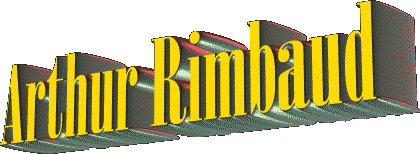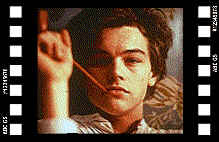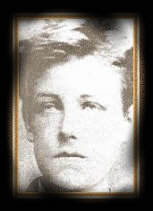

Stills from the
film TOTAL ECLIPSE
Leonardo DiCaprio portrayed Rimbaud,
while David Thewlis played his lover, Verlaine.
In 1871,
Arthur Rimbaud met Paul Verlaine, and if their friendship
was controversial, their sexual relationship was
downright scandalous. Rimbaud's drug taking and generally
unclean living eventually alienated everyone except Verlaine.


To Verlaine
London, Friday afternoon (4 July 1873)
Come back, come back, my dear friend, my only friend, come back. I swear I shall be kind. If I was cross with you, it was a joke which I was obstinately determined to carry on; I repent of it more than can be said. Come back, it will be quite forgotten. How terrible that you should have taken that joke seriously. For two days I have not stopped crying. Come back. Be brave, dear friend. Nothing is lost. All you have to do is make another journey. We'll live here again, very brave and very patiently. Oh! I beg you! It's for your good, besides. Come back, you'll find all your things here. I hope you realize now that there was nothing real in our argument. That frightful moment! But you -- when I signalled to you to get off the boat -- why didn't you come? Have we lived together for two years to come to this? What are you going to do? If you won't come here, would you like me to come and meet you where you are?
Yes, I was in the wrong.
Oh, you won't forget me, will you?
No, you can't forget me.
As for me, I still have you, here.
Listen, answer your friend, must we not
live together anymore?
Be brave. Answer this quickly. I can't
stay here much longer. Do not read this except with goodwill.
Quick, tell me if I must come to you.
Yours, all my life.
RIMBAUD

Arthur Rimbaud
Verlaine abandoned his wife and infant son, Georges, in July 1872, to wander with Arthur Rimbaud in northern France and Belgium and write "impressionist" sketches for his next collection, Romances sans paroles ("Songs Without Words").
Rimbaud and Verlaine reached London in September and found plenty of interest and amusement and also inspiration: Verlaine completed the Romances - the subjects are mostly landscape or regret or vituperation of his estranged wife. The collection was published in 1874.
During a battle with typhoid fever in 1879, Rimbaud decided to abandon his wanderings and settle down. In the employ of a coffee trader from Aden, he became the first white man to journey into the Ogaden region of Ethiopia and eventually became involved in arms-trading. While in Ethiopia, Rimbaud lived with a native woman and the home they shared became a mecca for traveling Europeans.
During this period of expatriation, Rimbaud's reputation as a poet grew in France. Verlaine had written about him and published a selection of his poems. These were enthusiastically received and in 1866, unable to determine Rimbaud's whereabouts, Verlaine published Rimbaud's prose poems, under the title Illuminations.
Soon after, Rimbaud developed a
tumor on his knee and returned to Roche, where he was
nursed by his devoted sister Isabelle. The tumor was
diagnosed as cancer and he died on November 10, 1891.
Arthur Rimbaud's literary style has influenced almost all modern forms of literature - he has been cited as an inspiration by songwriters like Bob Dylan, Patti Smith and Jim Morrison. Jim Morrison was greatly influenced by Arthur Rimbaud and he dutifully imparted Rimbaud's philosophy to the Doors.
Arthur Rimbaud
bibliography
Arthur Rimbaud's complete works are collected in Oeuvres, ed. by Suzanne Bernard and André Guyaux (1981); English-language editions are Collected Poems, trans. and ed. by Oliver Bernard (1962, reissued 1986), prose translations; and Complete Works, Selected Letters, trans. by Wallace Fowlie (1966, reissued 1977). The best English version of two of his works is A Season in Hell; The Illuminations, trans. by Enid Rhodes Peschel (1973).
Enid Starkie, Arthur Rimbaud, new ed. (1961, reprinted 1978); and Pierre Petitfils, Rimbaud, trans. by Alan Sheridan (1987; originally published in French, 1982), are biographies. Critical works include Yves Bonnefoy (ed.), Rimbaud par lui-même (1961); W.M. Frohock, Rimbaud's Poetic Practice: Image and Theme in the Major Poems (1963); John Porter Houston, The Design of Rimbaud's Poetry (1963, reprinted 1977); Margaret Davies, Une Saison en enfer d'Arthur Rimbaud: analyse du texte (1975); Atle Kittang, Discours et jeu: essai d'analyse des textes d'Arthur Rimbaud (1975); C.A. Hackett, Rimbaud: A Critical Introduction (1981); and James Lawler, Rimbaud's Theatre of the Self (1992). Source: ENCYCLOPÆDIA BRITANNICA
/Louis Bülow